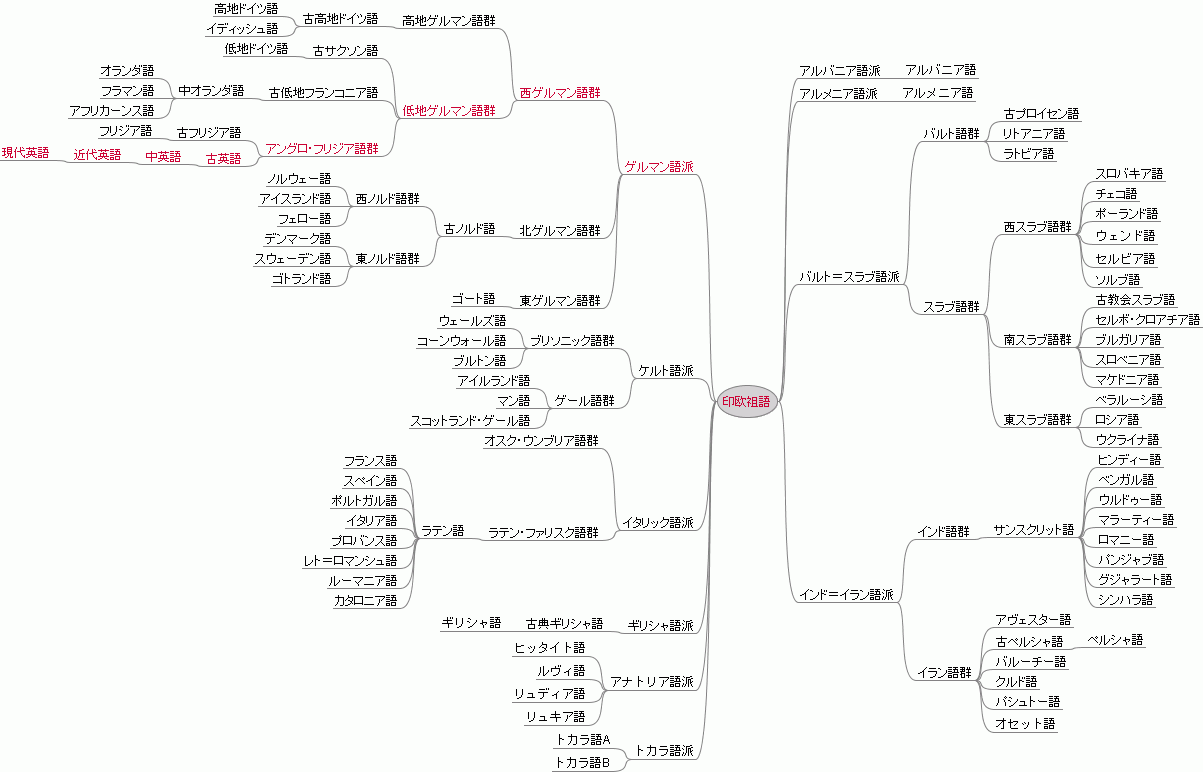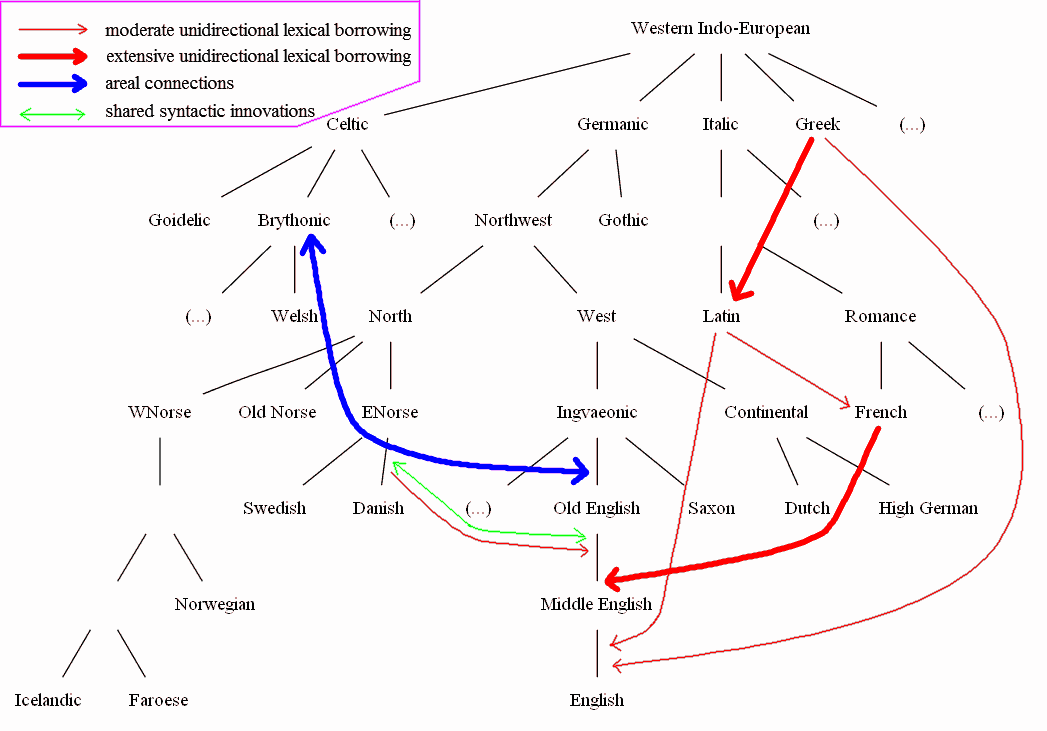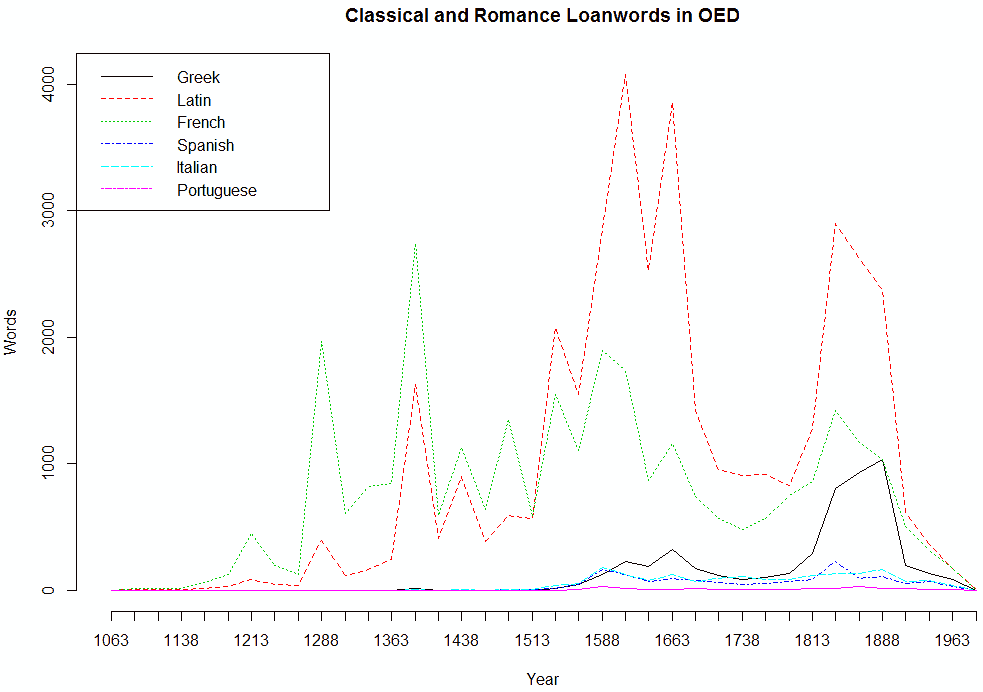4. 印欧語族
- 印欧語族の系統図 (#455)

- 英語と周辺の言語の関係 (#1930)

英語の語彙は世界一の規模を誇りますが,語源の観点からみても種類が実に豊富です.英語の語彙が規模・種類において豊かであることは,英語がたどってきた歴史,とりわけ多くの言語と交流してきた歴史と密接に関係しています.本講座では,日本語の語彙史とも比較対照させながら,英語の語彙史を通覧します.2019年から2021年にかけて全12回にわたって開講してきたシリーズ「英語の歴史と語源」の総括としても是非どうぞ.
* 本スライドは https://bit.ly/3wd0z09 からもアクセスできます.
規模の大きさ (#898)
OED2 によると約46万4千語(cf. ドイツ語は約18.5万語,フランス語は約10万語)
種類の豊富さ (##309,202,429,845,1202,110,201,384)
英語本来語が1/3,ラテン語・フランス語借用語が1/3,その他の言語からの借用語が1/3
「世界的語彙」 (cosmopolitan vocabulary)
350以上の言語から語彙を借用してきた歴史
| 言語 | 単語 |
|---|---|
| Afrikaans | apartheid, gnu, impala, indri, kraal, mamba, trek, tse-tse |
| Aleutian | parka |
| American Indian | chipmunk, moccasin, pow wow, skunk, squaw, totem, wigwam |
| Anglo-Saxon | God, Sunday, beer, crafty, gospel, house, rain, rainbow, sea, sheep, understand, wisdom |
| Arabic | algebra, assassin, azimuth, emir, ghoul, harem, hashish, intifada, mohair, sheikh, sherbet, sultan, zero |
| Araucanian | coypu, poncho |
| Australian | boomerang, budgerigar, dingo, kangaroo, koala, wallaroo, wombat |
| Brazilian | abouti, ai, birimbao, bossa nova, favela, jaguar, manioc, piranha |
| Canadian Indian | pecan, toboggan |
| Chinese | chopsuey, chow mein, cumquat, kaolin, ketchup, kung fu, litchi, sampan, tea, tycoon, typhoon, yen (=desire) |
| Czech | howitzer, pistol, robot |
| Dutch | bluff, cruise, easel, frolic, knapsack, landscape, poppycock, roster, slim |
| Eskimo | anorak, igloo, kayak |
| Finnish | sauna |
| French | anatomy, aunt, brochure, castle, cellar, challenge, chocolate, crocodile, cushion, debt, dinner, entrance, fruit, garage, grotesque, increase, jewel, justice, languish, medicine, montage, moustache, passport, police, precious, prince, sacrifice, sculpture, sergeant, table, trespass, unique, venison, victory, vogue, voyeur |
| Gaelic | banshee, brogue, galore, leprechaun |
| German | angst, dachshund, gimmick, hamburger, hamster, kindergarten, lager, nix, paraffin, plunder, poodle, sauerkraut, snorkel, strafe, waltz, yodel, zinc |
| Greek | anonymous, catastrophe, climax, coma, crisis, dogma, euphoria, lexicon, moussaka, neurosis, ouzo, pylon, schizophrenia, stigma, therm, thermometer, tonic, topic |
| Haitian | barbecue, cannibal, canoe, peccary, potato, yucca |
| Hawaiian | aloha, hula, lei, nene, ukulele |
| Hebrew | bar mitzvah, kibbutz, kosher, menorah, shalom, shibboleth, targum, yom kippur, ziggurat |
| Hindi | bungalow, chutney, dekko, dungaree, guru, gymkhana, jungle, pundit, pyjamas, sari, shampoo, thug |
| Hungarian | cimbalom, goulash, hussar, paprika |
| Icelandic | geyser, mumps, saga |
| Irish | blarney, brat, garda, taoiseach, whiskey |
| Italian | arcade, balcony, ballot, bandit, ciao, concerto, falsetto, fiasco, giraffe, lava, mafia, opera, scampi, sonnet, soprano, studio, timpani, traffic, violin |
| Japanese | bonsai, geisha, haiku, hara-kiri, judo, kamikaze, karate, kimono, shogun, tycoon, zaitech |
| Javanese | batik, gamelan, lahar |
| Korean | hangul, kimchi, makkoli, ondol, won |
| Latin | alibi, altar circus, aquarium, circus, compact, diocese, discuss, equator, focus, frustrate, genius, include, index, interim, legal, monk, nervous, onus, orbit, quiet, ulcer, ultimatum, vertigo |
| Malagasy | raffia |
| Malay | amok, caddy, gong, kapok, orang-outang, sago, sarong |
| Maori | haka, hongi, kakapo, kiwi, pakeha, whare |
| Nahuatl | axolotl, coyote, mescal, tomato, tortilla |
| Norwegian | cosy, fjord, krill, lemming, ski, slalom |
| Old Norse | both, egg, knife, low, sky, take, they, want |
| Persian | bazaar, caravan, divan, shah, shawl, sofa |
| Peruvian | condor, inca, llama, maté, puma, quinine |
| Polish | horde, mazurka, zloty |
| Polynesian | kava, poe, taboo, tapa, taro, tattoo |
| Portuguese | buffalo, flamingo, marmalade, pagoda, veranda |
| Quechuan | llama |
| Russian | agitprop, borsch, czar, glasnost, intelligentsia, perestroika, rouble, samovar, sputnik, steppe, troika |
| Sanskrit | swastika, yoga |
| Scottish | caber, cairn, clan, lock, slogan |
| Serbo-Croat | cravat, silvovitz |
| Spanish | albatross, banana, bonanza, cafeteria, cannibal, canyon, cigar, cobra, cork, dodo, guitar, hacienda, hammock, junta, marijuana, marmalade, molasses, mosquito, potato, rodeo, sherry, sombrero, stampede, supremo |
| Swahili | bongo, bwana, harmattan, marimba, safari, voodoo |
| Swedish | ombudsman, tungsten, verve |
| Tagalog | boondock, buntal, ylang-ylang |
| Tamil | bandicoot, catamaran, curry, mulligatawny, pariah |
| Tibetan | Koumiss, argali, lama, polo, shaman, sherpa, yak, yeti |
| Tongan | taboo |
| Turkish | aga, bosh, caftan, caviare, coffee, fez, jackal, kiosk, shish kebab, yoghurt |
| Vietnamese | ao dai, nuoc mam |
| Welsh | coracle, corgi, crag, eisteddfod, hwyl, penguin |
| Yiddish | chutzpah, gelt, kosher, nosh, oy vay, schemozzle, schmaltz, schmuk |
| Old English (449–1100) |
|
上代 | ○和語(やまとことば)が大部分を占めた. |
|
○2音節語が基本. | ||
|
○中国との交流の中で漢語が借用された.例:茶 胡麻 銭 (なお,仏教とともに伝えられたことばの中には「卒塔婆」「曼荼羅」のような梵語(古代インド語=サンスクリット語)も含まれている.) | ||
|
中古 | ○漢語が普及した.例:案内(あない) 消息(せうそこ) 念ず 切(せち)に 頓(とみ)に | |
|
○和文語と漢文訓読語との文体上の対立が見られる.例:カタミニ〈互に〉←→タガヒニ(訓読語) ク〈来〉←→キタル(訓読語) | ||
| Middle English (1100–1500) |
|
○派生・複合によって,形容詞が大幅に造成された. | |
|
中世 | ○漢語が一般化した. | |
|
○古語・歌語・方言・女房詞など,位相差についての認識が広く存在した. | ||
| Modern English (1500–1900) |
|
○禅宗の留学僧たちが,唐宋音で読むことばを伝えた.例:行燈(あんどん) 椅子(いす) 蒲団(ふとん) 饅頭(まんぢゅう) | |
|
○キリスト教の宣教師の伝来,また通商関係などにより,ポルトガル語が借用された.例:パン カルタ ボタン カッパ〈合羽〉 | ||
|
近世 | ○漢語がより一般化し,日常生活に深く浸透した. | |
|
○階層の分化に応じて語彙の位相差が深まった. | ||
|
○蘭学との関係でオランダ語が借用された.例:アルコール メス コップ ゴム | ||
| Present-Day English (1900–) |
|
近代 | ○西欧語の訳語として,新造漢語が急激に増加する.例:哲学 会社 鉄道 市民 |
|
○英米語を筆頭として,フランス語,ドイツ語,イタリア語などからの外来語が増加する. | ||
|
○長い複合語を省略した略語が多用される. | ||
|
| 動物名(英語本来語) | 肉の名前(フランス借用語) | 動物・肉(現代フランス語) |
|---|---|---|
| calf | veal | veau |
| deer | venison | venaison |
| fowl | poultry | poulet |
| sheep | mutton | mouton |
| swine (pig) | pork, bacon | porc, bacon |
| ox | beef | boeuf |
| 英語本来語(一般的) | フランス語(正式) | ラテン語・ギリシア語(知的) |
|---|---|---|
| ask | question | interrogate |
| book | volume | text |
| fair | beautiful | attractive |
| fast | firm | secure |
| fear | terror | trepidation |
| fire | flame | conflagration |
| foe | enemy | adversary |
| gift | present | donation |
| goodness | virtue | probity |
| hearty | cordial | cardiac |
| help | aid | assistance |
| holy | sacred | consecrated |
| kingly | royal | regal |
| lively | vivacious | animated |
| rise | mount | ascend |
| time | age | epoch |
| word | term | lexeme |
